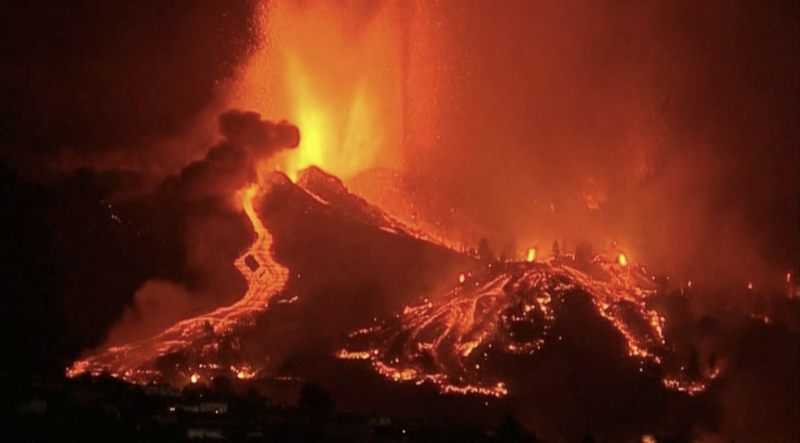La Palma volcano erupted Sunday
A volcano on the Atlantic island of La Palma – part of Spain’s Canary Islands – erupted on Sunday (September 19, 2021) after a week-long buildup consisting of thousands of small earthquakes. As of this morning (September 21), some 5,000 people are reported to have been evacuated from La Palma. Numerous homes, properties and farmland have been destroyed by lava. ITV reported this morning that firefighters are looking on as lava from the La Palma volcano flows through the streets. The lava is close to reaching the sea, and there are fears of explosions, plus the release of more toxic chemicals, when the lava hits the seawater. So, on La Palma today, people are being warned to stay away from the area.
The 2021 La Palma eruption is coming from Cumbre Vieja, considered to be one of the most active volcanos in the Canary Islands. Footage from local and international media shows the current eruption of red-hot lava and dust emanating from the Cumbre Vieja National Park in the south of the island. This volcano erupted twice in the 20th century, in 1949 and again in 1971. So, before Sunday’s eruption, the last eruption of this volcano on La Palma was 50 years ago. The 1971 eruption lasted just over three weeks.
This story will be updated. Check back for more information and images.
Lava fills swimming pool, headed to sea
The Nordic Optical Telescope (NOT) reported yesterday that it is safe. This telescope – located at Roque de los Muchachos Observatory, La Palma, in the Canary Islands – saw first light in 1988.
https://publish.twitter.com/?query=https%3A%2F%2Ftwitter.com%2Fnordictelescope%2Fstatus%2F1439886251981778944&widget=Tweet

Bottom line: Video and photos from the ongoing volcanic eruption on the island of La Palma, in Spain’s Canary Islands.
The post La Palma volcano lava headed to sea first appeared on EarthSky.
from EarthSky https://ift.tt/3nXGxTd
La Palma volcano erupted Sunday
A volcano on the Atlantic island of La Palma – part of Spain’s Canary Islands – erupted on Sunday (September 19, 2021) after a week-long buildup consisting of thousands of small earthquakes. As of this morning (September 21), some 5,000 people are reported to have been evacuated from La Palma. Numerous homes, properties and farmland have been destroyed by lava. ITV reported this morning that firefighters are looking on as lava from the La Palma volcano flows through the streets. The lava is close to reaching the sea, and there are fears of explosions, plus the release of more toxic chemicals, when the lava hits the seawater. So, on La Palma today, people are being warned to stay away from the area.
The 2021 La Palma eruption is coming from Cumbre Vieja, considered to be one of the most active volcanos in the Canary Islands. Footage from local and international media shows the current eruption of red-hot lava and dust emanating from the Cumbre Vieja National Park in the south of the island. This volcano erupted twice in the 20th century, in 1949 and again in 1971. So, before Sunday’s eruption, the last eruption of this volcano on La Palma was 50 years ago. The 1971 eruption lasted just over three weeks.
This story will be updated. Check back for more information and images.
Lava fills swimming pool, headed to sea
The Nordic Optical Telescope (NOT) reported yesterday that it is safe. This telescope – located at Roque de los Muchachos Observatory, La Palma, in the Canary Islands – saw first light in 1988.
https://publish.twitter.com/?query=https%3A%2F%2Ftwitter.com%2Fnordictelescope%2Fstatus%2F1439886251981778944&widget=Tweet

Bottom line: Video and photos from the ongoing volcanic eruption on the island of La Palma, in Spain’s Canary Islands.
The post La Palma volcano lava headed to sea first appeared on EarthSky.
from EarthSky https://ift.tt/3nXGxTd

Aucun commentaire:
Enregistrer un commentaire